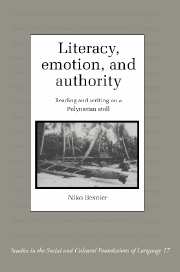Book contents
- Frontmatter
- Contents
- List of illustrations and tables
- Acknowledgments
- Transcription conventions and orthography
- 1 Introduction
- 2 The ethnographic context
- 3 The domains of reading and writing
- 4 Letter writing and reading
- 5 Letters, economics, and emotionality
- 6 Between literacy and orality: the sermon
- 7 Literacy, truth, and authority
- 8 Conclusion
- Notes
- References
- Index of Tuvaluan words
- General index
6 - Between literacy and orality: the sermon
Published online by Cambridge University Press: 14 August 2009
- Frontmatter
- Contents
- List of illustrations and tables
- Acknowledgments
- Transcription conventions and orthography
- 1 Introduction
- 2 The ethnographic context
- 3 The domains of reading and writing
- 4 Letter writing and reading
- 5 Letters, economics, and emotionality
- 6 Between literacy and orality: the sermon
- 7 Literacy, truth, and authority
- 8 Conclusion
- Notes
- References
- Index of Tuvaluan words
- General index
Summary
No social arena is as suffused with literacy on Nukulaelae as religion. The religious service is the only regular occasion in most Nukulaelae Islanders' weekly routine during which they read from a book, and carrying a Bible to church is a must (a hymnalis optional but desirable). On Sunday mornings, just before the beginning of the service at 9 a.m., a familiar domestic scene takes place in many Nukulaelae homes: as household members adjust their Sunday best and finish combing their hair, much good-natured bantering takes place over who will get to take the family's Bibles to church, since there usually aren't enough copies for every adult and child. Even four-year-old Semi in our household knows the particular relevance of books to church contexts: on many Sundays, to everyone's amusement and feigned indignation, he quietly sneaks away to Sunday School (held at the same time as the service in a thatched building adjacent to the pastor's house) clutching his father's Bible under his shirt, and hoping to be at a safe distance from the house before the disappearance of the Bible is noticed. Some Nukulaelae Islanders also bring to church books that are not generally used there, like an English Bible (a high prestige commodity), copies of religious pamphlets gleaned from various sources, or other printed materials of no obvious religious relevance, which they may or may not open during the service.
- Type
- Chapter
- Information
- Literacy, Emotion and AuthorityReading and Writing on a Polynesian Atoll, pp. 116 - 139Publisher: Cambridge University PressPrint publication year: 1995

